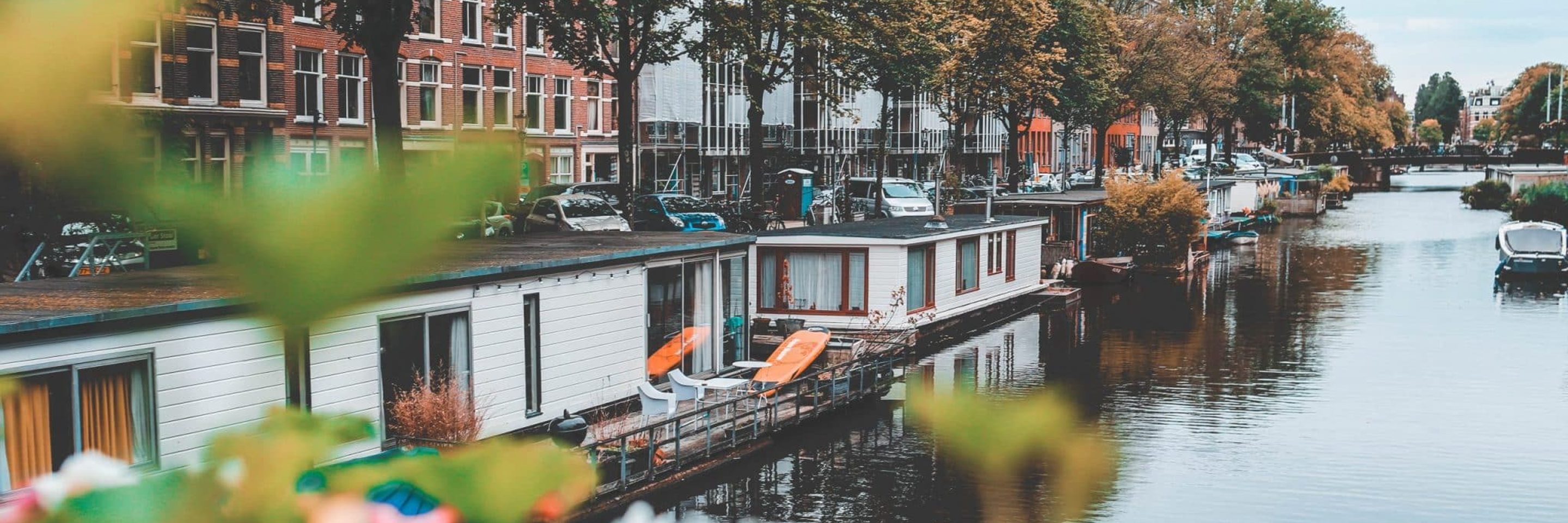
As space in big cities becomes increasingly scarce, and concerns about rising sea levels continue to mount, an innovative solution to float houses on water is emerging from the Netherlands.
With Amsterdam famous for having more than 100 kilometres of canals, living close to a waterway has been ingrained in its denizens’ way of life for centuries.
And with the city situated below sea level and prone to regular flooding, Amsterdammers have also long been proponents of living on those waterways, with thousands of houseboats on permanent moors being a lure for both visitors and residents alike.
But a relatively new neighbourhood in the north of the city has taken the canal-living concept to another level.
Floating atop the Johan van Hasseltkanaal and known as Schoonschip, the neighbourhood was created through more than a decade’s worth of research and lays claim to being one of the most sustainable housing developments in Europe.
The neighbourhood was built in line with the Dutch government’s edict that new housing developments are energy neutral, or as the locals say ‘nul op de meter’, which translates to English as zero on the meter.
But perhaps its most innovative feature is the complex of 30 ‘arks’ that provide homes for 144 residents — which can rise up and slide down their foundations as water levels fluctuate due to seasonal variations or unexpected flooding.
Charlotte Dazler, Manager Real Estate Business Advisory at Baker Tilly Netherlands, said Schoonschip was a good example of the creativity being applied by developers as space for residential development becomes increasingly scarce.
“In Amsterdam and the bigger cities, we see more creativity emerging to make use of the crowded spaces,” Ms Dazler said.
“Developers and municipalities are trying to make the best out of it and use the space on the waterfront as well.
“In Amsterdam, there are floating houses in nearly every canal. But this specific development isn’t just a floating housing development, it’s also about sustainability and limiting your footprint on earth.
“The Schoonschip project is completely built around the concept of being as environmentally and economically friendly as possible.”
“You have to be quite brave to start a project like this, but what we see now is they sustain their value.”
Elsewhere in the world, floating homes are being pitched as a possible solution to nations threatened by rising sea levels.
In the Maldives, Netherlands-headquartered developer Dutch Docklands and architecture firm Waterstudio is advancing plans to build thousands of floating homes in a 200 hectare lagoon close to the country’s capital, Male.
Known as Maldives Floating City, the development will also have a similar sustainability focus to the Schoonschip and could hold the key to future-proofing development in the Maldives, where more than 80 per cent of the country’s land mass sits less than one metre above sea level.
International shipbuilding consortium MEYER Group is also rapidly expanding its floating real estate division, offering a variety of housing options ranging from individual villas to resort-style properties.
In early March, MEYER Group announced a partnership with ADMARES Marine, a market leader in floating real estate, to form MEYER Floating Solutions.
The companies have previously developed a range of floating real estate developments in the Middle East, including the world’s largest floating villa.
In the Caribbean, luxury development company The Blue Estate Group has unveiled its own ambitious plan to build a floating island half the size of Monaco between the Bahamas and Miami.
While sharing similar sustainability principles as other floating real estate developments, The Blue Estate Group’s proposal is pitched at the ultra-rich, with two mega mansions each having an estimated $1.15 billion price tag.
Baker Tilly’s Ms Dazler said it was clear why developers were becoming interested in floating real estate, because building on the water rather than close to it created highly valuable and sought-after properties.
“The development costs are quite high, and you have to be quite brave to start a project like this, but what we see now is they sustain their value,” Ms Dazler said.
“The value is also based on where the house is located, and these spots are quite rare.
“Because we are only at the forefront of developing houses that are floating, municipalities are not quite willing to provide permission to put houses everywhere on the water.
“The spots available in Amsterdam are rare and limited by 2,500 within the city. This makes the demand for spots higher than the available places.”

But while momentum continues to build and developers become increasingly ambitious and bullish around the concept, Ms Dazler said there were several hurdles that needed to be cleared before it became mainstream.
The biggest challenge, Ms Dazler said, is that most lenders in the Netherlands will not finance floating houses, with only Rabobank currently willing to fund their development or provide loans for their purchase.
“There is a major difference with floating real estate and conventional properties because when you buy a normal residential house, you are the owner of the house and the land as well,” she said.
“But when it comes to a floating house, you only own the part which connects the house to the land. You are not the owner of the water underneath or the soil underneath. So that is a different legal restriction, and that’s the reason that many financial institutions aren’t too keen on providing financing for it.
“The question is what are you financing? Is it just the floating house or is it the whole area that the house is covering?
“And now we are in the stage that you buy the house, including the land where it is attached to, but the water still belongs to the municipality.”
Constructing the houses is also a tricky proposition, with most floating homes in the Netherlands constructed in a warehouse or a dock, then placed in the water and towed to the canal site by another vessel.
“That is nerve wracking for the developer, because there are bridges and river crossings, and it is quite a process,” she says.
“The logistics behind it are very complicated.”
Looking forward, Ms Dazler said she expected the concept to evolve swiftly, with a trial underway in Amsterdam to evaluate the possibility of building farms on floating platforms.
However, for floating property to become more mainstream, Ms Dazler said the sector needed more critical mass.
“The first and most important step would be more developers getting on board and more municipalities making space available,” she said.
“The information is quite scattered and subdivided over developers, and there isn’t one developer that is extremely knowledgeable and skilled to develop these floating houses.
“But if you could pack it all together, there would be more knowledge, and it would be easier to develop these less expensively.”









